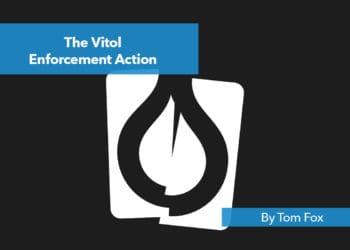Willkie Farr’s William Stellmach, Robert Meyer and Sohair Aguirre discuss the latest guidance from the CFTC on self-reporting and cooperation, along with an overview of the Advisory, an analysis of similarities to and differences from other policies.
with co-author Sohair Aguirre
On March 6, 2019, the Commodity Futures Trading Commission’s (CFTC) Division of Enforcement (DOE or “Division”) issued a fourth Enforcement Advisory related to reporting and cooperation (“Advisory”). This Advisory is limited to violations of the Commodity Exchange Act (CEA) involving foreign corrupt practices.
Key Components of the Advisory
The purpose of the Advisory is to provide leniency to individuals or companies who self-report foreign corrupt practices to the Division. Specifically, the Advisory provides that if an individual or a company that is not registered (or required to be registered) with the CFTC: (1) timely and voluntarily discloses to the Division information related to violations of the CEA involving foreign corrupt practices and (2) such reporting is accompanied by full cooperation and appropriate remediation (as further explained in prior Division reporting and cooperation advisories), then the Division “will apply a presumption that it will recommend to the CFTC a resolution with no civil monetary penalty, absent aggravating circumstances involving the nature of the offender or the seriousness of the offense.”[1]
Examples of aggravating circumstances that would preclude the application of such presumption include:
- involvement of senior management,
- the pervasive nature of the misconduct within the company and
- any history of similar misconduct.
While the presumption is not available to registrants (because registrants have existing and independent reporting obligations to report material noncompliance issues under the CEA), registrants who timely and voluntarily report, cooperate and remediate any CEA violations related to corrupt foreign practices may nevertheless benefit from a “substantial reduction” in recommended civil monetary penalties.
Finally, the Advisory notes that even when the Division applies the presumption and recommends no civil monetary penalty, the Division may seek other appropriate monetary remedies such as disgorgement, forfeiture and/or restitution. Additionally, the Division may seek substantial civil monetary penalties from companies or individuals implicated by the reporting that were not involved in the voluntary disclosure.
Additional Guidance from Enforcement Director James McDonald
In a speech at the American Bar Association’s National Institute on White Collar Crime, DOE Director James McDonald provided examples of CEA violations involving foreign corrupt practices and also furnished additional guidance on how the Division anticipates applying the Advisory. Regarding examples of CEA violations, Director McDonald referenced the following corrupt practices:
- Bribes employed in connection with CFTC-regulated activities such as trading, advising or dealing in swaps or related derivative contracts;
- Corrupt practices used to manipulate benchmarks for related derivative contracts;
- False reporting of prices based on corrupt practices; or
- Other corrupt practices that might alter the prices of commodity markets that drive U.S. derivative prices.
Director McDonald emphasized that the Division is currently investigating matters involving conduct similar to the examples summarized above. He also reassured the attendees, however, that in investigating these types of cases, the DOE “will not pile onto other existing investigations.”[2] In that regard, he emphasized both that in matters involving parallel investigation, DOE will “work closely with [other relevant federal agencies] to avoid duplicative investigative steps,” and, in cases involving the imposition of disgorgement or restitution, will give dollar-for-dollar credit for similar payments in other related actions.[3]
Similarities to Other Agencies’ Policies
Although various other government agencies have instituted similar initiatives aimed at incentivizing self-disclosure, the CFTC’s new policy most clearly mirrors the Foreign Corrupt Practices Act (FCPA) self-disclosure policy of the Department of Justice (DOJ).[4] Initially launched as a pilot program and then made permanent last year, DOJ’s policy likewise creates a presumption of leniency for self-disclosing parties, absent aggravating factors.[5] That presumption, again like the CFTC’s new policy, depends on the self-disclosing party’s full cooperation and remediation. Notably, the DOJ policy spells out more precisely the potential discounts from any financial penalties based on whether parties meet those requirements and also the benefits for parties who fail to self-disclose but nevertheless cooperate and remediate.[6]
At this stage, beyond providing the rough contours for the CFTC, it remains to be seen whether the CFTC will adopt other aspects of the DOJ policy, which includes a more granular description of the metrics by which cooperation and remediation are judged. And, as with any policy, the real impact will only be seen through the CFTC’s approach to enforcement, particularly in providing meaningful incentives to establish a track record of predictability for self-disclosure.
Although the Advisory mirrors the DOJ’s FCPA self-disclosure policy, it does not mirror the CFTC’s existing self-reporting and cooperation credit for all other violations of the CEA.[7] For example, if a market participant self-reports, cooperates and remediates any other violation of the CEA (not related to foreign corrupt practices), the Division will decline to take an enforcement action only under “extraordinary circumstances.” As alluded to in Director McDonald’s remarks, this difference in the CFTC cooperation advisories is likely because DOE recognizes that there are other, more relevant enforcers for foreign corrupt practices issues, but DOE intends to do its job as part of a “team effort” to combat foreign bribery.[8]
Practical Implications of the Advisory
The CFTC’s new policy highlights the importance of careful consideration of self-disclosure issues under the FCPA. As a practical matter, the benefits of self-disclosure reflected in the CFTC Advisory will ordinarily not drive the decision whether or not to disclose a potential violation, given that criminal prosecution by the DOJ and/or civil enforcement by the Securities and Exchange Commission likely would carry more significant fines and penalties. Nevertheless, as the CFTC’s policy illustrates, a self-disclosing company may face many constituencies in the U.S. and abroad whose enforcement goals and priorities may or may not be complementary, and these must be considered at the outset in determining whether self-disclosure is in a company’s best interest.
Moreover, the CFTC’s new policy also clearly signals as a general matter increasing scrutiny of potential foreign corrupt practices by market participants. CFTC scrutiny will include an evaluation of any putative respondent’s foreign corrupt practices compliance program as part of any evaluation of potential aggravating circumstances in the event of a self-disclosure to or inquiry by the CFTC. An inadequate compliance program will be considered an aggravating factor, thus any market participant with operations outside the United States should evaluate its anticorruption compliance program now and bring it up to best practices standards.
[1] See Enforcement Advisory: Advisory on Self Reporting and Cooperation for CEA Violations Involving Foreign Corrupt Practices (Mar. 6, 2019), available at https://www.cftc.gov/sites/default/files/2019-03/enfadvisoryselfreporting030619.pdf?utm_source=govdelivery. [2] See Remarks of CFTC Director of Enforcement James M. McDonald at the American Bar Association’s National Institute on White Collar Crime (March 6, 2019), available at https://www.cftc.gov/PressRoom/SpeechesTestimony/opamcdonald2?utm_source=govdelivery. [3] Id. [4] The U.S. Securities and Exchange Commission has long had guidance in place to incentivize self-reporting and cooperation. The SEC’s program regards self-reporting as one of several factors in measuring a company’s cooperation, a model that informed the CFTC’s approach in its January 2017 cooperation advisories. Relatedly, in 1993, the Antitrust Division of the Justice Department implemented a “leniency” program which rewards self-disclosing parties with reduced penalties or even outright immunity from prosecution. [5] An analysis of the DOJ’s Corporate FCPA Enforcement Policy can be found here. The policy itself is at https://www.justice.gov/criminal-fraud/file/838416/download. [6] DOJ FCPA Corporate Enforcement Policy, available at https://www.justice.gov/criminal-fraud/file/838416/download. [7] A summary of the CFTC’s prior self-reporting and cooperation credit advisories is available here. [8] See Remarks of CFTC Director of Enforcement James M. McDonald at the American Bar Association’s National Institute on White Collar Crime (March 6, 2019), available at https://www.cftc.gov/PressRoom/SpeechesTestimony/opamcdonald2?utm_source=govdelivery.



 William J. Stellmach is a Partner at Willkie Farr & Gallagher LLP. A distinguished former federal prosecutor and regulator, Bill previously served as head of the Fraud Section of the U.S. Department of Justice’s Criminal Division and is now a partner in Willkie’s Litigation department and Co-Chair of the White Collar Defense Group. Drawing on a wide range of experience, he regularly represents financial institutions, domestic and multinational corporations, board committees and their officers, directors and other executives in high-stakes investigations and enforcement actions.
William J. Stellmach is a Partner at Willkie Farr & Gallagher LLP. A distinguished former federal prosecutor and regulator, Bill previously served as head of the Fraud Section of the U.S. Department of Justice’s Criminal Division and is now a partner in Willkie’s Litigation department and Co-Chair of the White Collar Defense Group. Drawing on a wide range of experience, he regularly represents financial institutions, domestic and multinational corporations, board committees and their officers, directors and other executives in high-stakes investigations and enforcement actions. Robert J. Meyer is a Partner in the Litigation department at Willkie Farr & Gallagher LLP and a member of the Compliance, Investigations & Enforcement Practice Group in Washington, D.C. He is nationally recognized for his experience conducting internal investigations and in government enforcement matters involving the Foreign Corrupt Practices Act, the False Claims Act, government ethics, accounting fraud, bribery, fraud and whistleblower allegations. As a former federal prosecutor with substantial trial experience, Bob is frequently called upon to defend criminal and civil enforcement matters involving all of these subject matter areas.
Robert J. Meyer is a Partner in the Litigation department at Willkie Farr & Gallagher LLP and a member of the Compliance, Investigations & Enforcement Practice Group in Washington, D.C. He is nationally recognized for his experience conducting internal investigations and in government enforcement matters involving the Foreign Corrupt Practices Act, the False Claims Act, government ethics, accounting fraud, bribery, fraud and whistleblower allegations. As a former federal prosecutor with substantial trial experience, Bob is frequently called upon to defend criminal and civil enforcement matters involving all of these subject matter areas.








